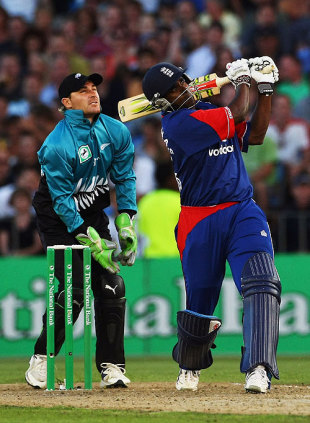|
|
|

Cashing in: Dimitri Mascarenhas gets into IPL's swing
© Getty Images
|
|
| |
Since accepting the position of chief
executive of the PCA (Professional Cricketers' Association) in December I have seen
the cricket landscape change more in three
months than it probably has in the previous 30
years. The question that was immediately on
my lips was: can we have increased wealth without
harming the health of our game?
Dressing rooms around the counties are full
of professional cricketers looking forward to
another season, but in every one of them are
players casting their eyes further afield to the
riches of Indian Twenty20 cricket. And who can
blame them?
In any profession the opportunity to maximise
earning potential is a natural right of the
employee. We have seen sports stars, particularly
in the United States and more recently in
European football, behave as "free agents". This has
rarely applied to cricketers, for whom club loyalty is
perhaps stronger, and the most recent rules from
the ECB ensure that restrictions apply if a player
decides to play for the Indian Cricket League.
The huge investment in Indian Twenty20
cricket provides potential benefits for our
players. Undoubtedly both their leagues have
significantly increased the market value of the
player and for the first time since the 1970s they
provide alternative employment opportunities for
the leading stars.
Importantly, the rapid emergence of the
Indian Premier League has challenged the game's
administrators. This is a good thing. It forces us
all to make improvements to our own products
and services that we deliver for the cricketer and
for the game's followers. All the players I have
met on our pre-season rounds are in favour
of the increased investment in the game and
the personal benefits it brings. But before the
players rush off to India, we must look at the
potential impacts these actions could have on
the health of our domestic game.
Some would say the Indian approach to
setting up these leagues has been predatory. The
country's financial control of the international game has just been given a further cash
injection that benefits the Indian board and its
ICC-sanctioned IPL. If it was predatory before,
how would the Indian board behave if it wanted
to pick off England's leading players?
Our domestic game relies on the substantial
revenues of the broadcasting deal. Should
events in India threaten this, then our game
has serious problems that would affect all
professional cricketers and the investment in
grass-roots programmes. Losing top players
to India would lower the value of any future
broadcasting agreement.
Twenty20 has been a big financial
success in England and Wales. It has attracted a new, younger audience to the game,
growing our supporter base. If India can create
a global Twenty20 extravaganza that increases
the number of followers, then congratulations to them.
But let us take advantage at the same time. The
opportunity lies much closer home than
Mumbai and New Delhi - in north London.
In May 2007 the PCA released a document
called Tougher Structures to Test County Players and
many of the recommendations have been adopted
in four-day cricket for 2008. That document
also contained some interesting ideas for the
improvement of our own Twenty20 competition.
These included rescheduling of the tournament
to fit within school holidays, and a mini-break
within the season to accommodate the event.
Perhaps we should go further, develop
our own domestic tournament as the world's
premier Twenty20 club event with the finest
international players participating for our own
clubs and invite the domestic champions from
the other Test-playing nations to participate in a
Champions League-style Twenty20 festival. England (and Wales) has one unique advantage
in that it is the only Test-playing nation that
plays from April to September, so our summer
does not conflict with the others'. This means
the vast majority of international players from
other countries are potentially available during
our season. If we could use this advantage
alongside and create the leading domestic
Twenty20 tournament in the world, then we have
a commercial opportunity that would enable us
to take advantage of the huge appetite for cricket
in Asia.
In short, this could reduce the threat of losing
our top players to India during our season; we
could attract the finest international players to
our shores; and we could significantly enhance
the appeal of our broadcasting rights on offer.
Sean Morris recently succeeded Richard Bevan as chief
executive of the Professional Cricketers' Association. This article was first published in the May 2008 issue of the Wisden Cricketer. Subscribe here
